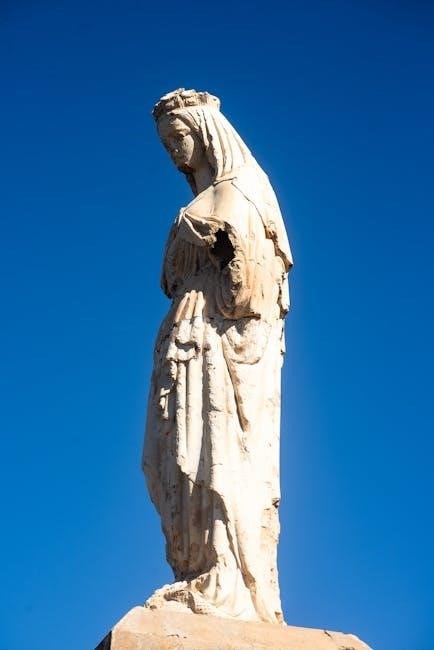
medea euripides pdf
Medea‚ a tragedy by Euripides‚ first performed in 431 BC‚ is one of the greatest works of ancient Greek literature‚ exploring themes of revenge‚ betrayal‚ and justice. This play‚ centered around Medea’s devastating revenge against her husband Jason‚ remains a cornerstone of Western drama‚ offering profound insights into human emotions and moral dilemmas. The Medea Euripides PDF provides an accessible format for reading and analyzing this timeless masterpiece‚ preserving its original depth and emotional intensity for modern readers and scholars alike.
1.1 Background of the Play
Medea‚ written by Euripides in 431 BC‚ is a tragedy based on the myth of Jason and Medea. The play explores Medea’s devastating revenge after being betrayed by Jason‚ who abandons her for another woman. This iconic work delves into themes of love‚ betrayal‚ and justice‚ making it a cornerstone of ancient Greek drama and a timeless study of human emotion and conflict.
1.2 Importance of the PDF Version
The Medea Euripides PDF offers a convenient and accessible way to engage with this ancient tragedy. It preserves the original text’s integrity while allowing readers to easily navigate and study the play’s themes‚ characters‚ and dramatic elements; The PDF format ensures that Euripides’ powerful narrative remains accessible to modern audiences‚ facilitating both academic and personal exploration of this timeless masterpiece.
Plot Summary of Medea
Medea‚ a tragedy by Euripides‚ revolves around Medea’s relentless revenge against her husband Jason for his betrayal. The play unfolds her emotional turmoil‚ strategic plotting‚ and the tragic consequences of her actions‚ culminating in a devastating climax that explores themes of betrayal‚ justice‚ and the extreme lengths of human vengeance. The Medea Euripides PDF captures the intensity and depth of this ancient narrative‚ ensuring its enduring relevance for modern readers.
2.1 Setting of the Play
Medea is set in ancient Corinth‚ where Medea and Jason have fled after their adventures. The city’s royal court‚ ruled by King Creon‚ becomes the backdrop for Jason’s betrayal‚ as he seeks to marry Creon’s daughter. This setting highlights Medea’s isolation and the political tensions that fuel her revenge‚ reflecting the societal norms of 5th-century BCE Greece.
2.2 Main Characters Overview
Medea‚ the protagonist‚ is a powerful sorceress and Jason’s wife‚ driven by rage and betrayal. Jason is her unfaithful husband‚ who abandons her for Glauce‚ Creon’s daughter. Creon‚ the King of Corinth‚ banishes Medea‚ fearing her wrath. The Chorus‚ composed of Corinthian women‚ provides emotional support to Medea and serves as a moral commentator‚ while Medea’s children become tragic victims of her revenge.
2.3 Key Events in the Play
- Medea discovers Jason’s betrayal and vows revenge.
- The Nurse reveals the plot‚ highlighting Medea’s fury.
- Medea persuades the Chorus to swear silence about her plans.
- Creon banishes Medea‚ fearing her wrath.
- Medea sends poisoned gifts to Glauce‚ killing her and Creon.
- Medea murders her children‚ leaving Jason devastated.
- Medea escapes in a chariot‚ leaving destruction behind.

Historical Context
Written in 431 BC‚ Medea reflects the societal norms and justice themes of ancient Greece. Euripides’ exploration of injustice and human emotion remains timeless.
3.1 Ancient Greek Theatre
Medea emerged within the context of ancient Greek theatre‚ a cultural cornerstone of Athens. Performed at the Dionysia festival‚ it showcased Euripides’ innovative storytelling. The play reflects the era’s theatrical conventions‚ such as the chorus’s role in narrative progression. Its exploration of revenge and moral dilemmas exemplifies the depth of Greek tragedy‚ making it a landmark work in classical drama.
3.2 Euripides’ Influence
Euripides’ Medea stands as a testament to his enduring influence on Western drama. His innovative storytelling and complex character development revolutionized Greek tragedy. The play’s exploration of human emotion‚ particularly through its female protagonist‚ set a new standard for dramatic depth. Euripides’ ability to challenge societal norms and evoke empathy for controversial figures like Medea has left a lasting legacy‚ shaping modern interpretations of tragedy and human conflict.
Major Themes in Medea
The play explores themes of revenge‚ love‚ betrayal‚ justice‚ and morality‚ delving into the complexities of human emotion and the destructive power of unchecked passion and ambition.
4.1 Theme of Revenge
The theme of revenge in Medea is central‚ as the titular character seeks vengeance against Jason for his betrayal. Medea’s transformation from a devoted wife to a vengeful figure underscores the destructive power of unchecked anger. Her calculated revenge‚ including the murder of her children‚ highlights the devastating consequences of pursuit of retribution‚ making it a timeless exploration of human emotion and morality.
4.2 Love and Betrayal
The play explores the devastating consequences of love turned to betrayal. Medea‚ once deeply devoted to Jason‚ is shattered by his decision to abandon her for another woman. Her love transforms into anguish and fury‚ highlighting the destructive power of betrayal in relationships. Jason’s pursuit of political advantage over personal loyalty underscores the tragedy of lost love and trust.
4;3 Justice and Morality
Medea’s pursuit of justice is driven by her deep sense of betrayal‚ blurring the lines between morality and vengeance. Euripides examines the conflict between personal justice and societal morality‚ raising questions about the ethics of revenge. The play challenges traditional norms‚ highlighting the destructive consequences of unchecked vengeance while exploring themes of righteousness and moral accountability.
Character Analysis
Medea is a complex‚ powerful woman driven by revenge‚ while Jason embodies betrayal and ambition. The Chorus provides moral commentary‚ enriching the emotional and psychological depth of the play.
5.1 Medea as a Tragic Hero
Medea embodies the archetype of a tragic hero‚ possessing great intelligence and magical powers. Her downfall stems from her own actions‚ driven by a tragic flaw: her uncontrollable rage and desire for revenge. Despite her strength‚ she is undone by her emotions‚ making her a deeply human and relatable figure in Euripides’ masterpiece.
5.2 Jason’s Role and Downfall
Jason’s ambition and pursuit of social advancement lead to his downfall. His decision to marry Glauce‚ despite his vows to Medea‚ sparks her devastating revenge. His lack of empathy and failure to understand Medea’s emotional depth ultimately result in the loss of his new wife‚ children‚ and reputation‚ highlighting the destructive consequences of his selfish desires and betrayal.
5.3 The Chorus’s Role
The chorus in Euripides’ Medea serves as both commentator and emotional anchor. Composed of Corinthian women‚ they empathize with Medea while fearing her rage. Their reflections bridge Medea’s inner turmoil with external events‚ offering insights into themes like justice and morality. Their presence underscores the tragedy’s emotional depth and societal implications‚ connecting the audience to the unfolding drama’s moral complexities and human suffering.

Stage Directions and Dramatic Elements
In Euripides’ Medea‚ stage directions emphasize the skene as Medea’s house and the mechane’s dramatic use for the chariot‚ heightening the play’s tragic intensity and visual spectacle.
6.1 The Skene in Medea
The skene in Medea represents Medea’s house‚ serving as a central backdrop for the play’s dramatic events. Its design emphasizes Medea’s isolation and the tragic unfolding of her revenge‚ providing a visual anchor for the audience. The skene’s structure symbolizes her confined yet powerful presence‚ central to the play’s emotional and narrative development.
6.2 Use of Mechane
The mechane‚ or stage crane‚ is famously used in Medea to transport her and her children on a winged chariot at the play’s conclusion. This dramatic device emphasizes Medea’s divine exit and her escape from human justice‚ showcasing her supernatural powers and leaving a lasting visual impact on the audience. The mechane highlights Medea’s triumph and tragic defiance.
Symbolism in Medea
Medea is rich in symbolic elements‚ such as the chariot and potions‚ which represent power‚ transformation‚ and divine intervention. These symbols enhance the play’s dramatic and thematic depth.
7.1 The Chariot Symbolism
The chariot in Medea symbolizes divine power and escape‚ provided by Helios‚ Medea’s grandfather. It represents her supernatural origins and her final triumph over Jason. The chariot’s appearance contrasts with Jason’s mortal downfall‚ emphasizing Medea’s control and divine justice. This element underscores the play’s themes of revenge and the intersection of human and divine spheres.
7.2 The Potion as a Symbol
The potion‚ a magical concoction created by Medea‚ symbolizes her cunning and supernatural power. It facilitates her revenge‚ causing the death of Jason’s new bride and her father. The potion represents both destruction and transformation‚ highlighting Medea’s dual role as a sorceress and a wronged wife. It underscores the deadly consequences of betrayal and the blurred lines between justice and vengeance.

Adaptations and Interpretations
Medea has inspired numerous stage productions and film adaptations‚ reimagining Euripides’ tragedy for modern audiences. These interpretations highlight the play’s timeless themes and universal emotional resonance‚ ensuring its relevance across centuries through diverse artistic expressions.
8.1 Modern Stage Productions
Modern stage productions of Medea reinterpret Euripides’ classic‚ exploring extreme emotions‚ race‚ and motherhood. Theatre companies like Theatre Lab and Strickland’s productions emphasize intergenerational trauma and mental health‚ offering fresh perspectives on the timeless tragedy. These adaptations highlight the universal relevance of Medea’s themes‚ making the ancient story resonate with contemporary audiences through innovative storytelling and diverse artistic visions.
8.2 Film Adaptations
Film adaptations of Medea bring Euripides’ tragic heroine to the screen‚ capturing her emotional depth and complexity. These adaptations often emphasize Medea’s transformation from a devoted wife to a vengeful figure‚ exploring themes of betrayal and justice. By translating the play’s dramatic elements into cinematic language‚ films offer a visual and emotional engagement with the ancient narrative‚ making it accessible to a broader audience while preserving its original intensity.
PDF Resources and Accessibility
The Medea Euripides PDF is a valuable resource for studying the tragedy. It is available for download from various online sources‚ providing access to the full text‚ study guides‚ and detailed commentaries. The PDF format ensures easy readability and accessibility‚ making the play accessible to a wide audience.
9.1 Where to Download the PDF
The Medea Euripides PDF can be downloaded from reputable sources like Google Books‚ Project Gutenberg‚ or academic websites. Many universities and online libraries offer free or paid versions of the play in PDF format‚ ensuring easy access for readers and scholars.
9.2 Study Guides and Commentaries
Medea Euripides PDF versions often include study guides and commentaries‚ offering in-depth analyses of themes‚ characters‚ and historical context. These resources provide summaries of key scenes‚ explanations of dramatic elements like the chorus‚ and insights into Euripides’ writing style‚ enhancing understanding for both students and scholars of ancient Greek tragedy.

Feminist Interpretations
Medea is a symbol of female resistance and empowerment‚ challenging patriarchal norms in Euripides’ play. The Medea Euripides PDF highlights her struggle for justice and autonomy‚ resonating with feminist themes.
10.1 Medea as a Feminist Icon
Medea embodies a powerful feminist figure‚ defying patriarchal norms and asserting her autonomy. The Medea Euripides PDF reveals her transformation from a devoted wife to a vengeful icon‚ symbolizing resistance against systemic oppression and gender inequality. Her actions‚ though extreme‚ highlight the societal constraints placed on women‚ making her a enduring symbol of female empowerment and resilience.
10.2 Gender Dynamics
Euripides’ Medea explores the gender dynamics of ancient Greek society‚ highlighting the oppression of women in a patriarchal world. The Medea Euripides PDF reveals how Medea’s agency is stripped away‚ forcing her into a corner of revenge. Her struggle against Jason’s betrayal symbolizes the broader societal constraints on women‚ making her defiance a powerful commentary on gender inequality and female subjugation.
Political Interpretations
Euripides’ Medea portrays power struggles and societal hierarchies‚ reflecting political tensions of ancient Greece. The PDF version highlights Medea’s defiance as a political statement against patriarchal norms.
11.1 Power Struggles
In Euripides’ Medea‚ power struggles are central to the narrative. Medea challenges patriarchal authority‚ using her intelligence and magic to reclaim agency. The PDF version underscores her defiance against Jason and Creon‚ symbolizing resistance against systemic oppression. This dynamic reflects broader political tensions in ancient Greek society‚ where women’s roles were deeply contested and often marginalized.
11.2 Social Hierarchies
Medea highlights the rigid social hierarchies of ancient Greece‚ particularly the subjugation of women and foreigners. As a foreign sorceress‚ Medea challenges Corinth’s patriarchal norms‚ defying the societal expectations imposed upon her. The PDF version emphasizes her struggle against these structures‚ illustrating how her outsider status fuels her rebellion and underscores the oppressive nature of the societal order she confronts.
Modern Relevance
Medea remains strikingly relevant today‚ its exploration of revenge‚ betrayal‚ and gender dynamics resonating with contemporary issues. The PDF version ensures accessibility‚ allowing modern readers to engage with Euripides’ timeless themes‚ making it a vital text for understanding both ancient and modern human struggles.
12.1 Timeless Themes
Medea by Euripides addresses universal themes like revenge‚ betrayal‚ and love‚ which remain poignant today. Its exploration of gender dynamics and morality continues to resonate‚ offering insights into human nature. The play’s enduring relevance is evident in its ability to provoke reflection on justice‚ power‚ and emotional complexity‚ ensuring its appeal across centuries. The PDF version makes these timeless themes accessible to modern readers.
12.2 Cultural Impact
Medea has profoundly influenced literature‚ art‚ and theatre‚ shaping perceptions of revenge and feminism. Its exploration of complex human emotions continues to inspire adaptations in film‚ stage‚ and literature. The play’s cultural significance is amplified by its enduring relevance‚ making it a cornerstone of classical studies. The PDF version ensures its accessibility‚ preserving its legacy for future generations to study and appreciate.
Medea by Euripides remains a timeless masterpiece‚ exploring themes of revenge‚ betrayal‚ and justice. Its cultural impact endures‚ and the Medea Euripides PDF ensures its accessibility for modern readers‚ preserving its legacy as a profound study of human emotion and moral complexity.
13.1 Summary of Key Points
Medea‚ a tragedy by Euripides‚ explores themes of revenge‚ betrayal‚ and justice through the story of Medea’s devastating retaliation against Jason. The play’s cultural impact is profound‚ with its exploration of human emotions and moral dilemmas remaining timeless. The Medea Euripides PDF provides accessible insight into this classic‚ highlighting its enduring influence on literature and theater‚ ensuring its themes resonate with modern audiences.
13.2 Final Thoughts
Medea by Euripides remains a powerful exploration of human nature‚ revenge‚ and justice. The Medea Euripides PDF offers a convenient and insightful way to engage with this timeless tragedy‚ allowing readers to delve into its themes and emotional depth. Its enduring relevance underscores the importance of classical literature in understanding human emotions and societal dynamics‚ ensuring its legacy endures through accessible formats like the PDF version.